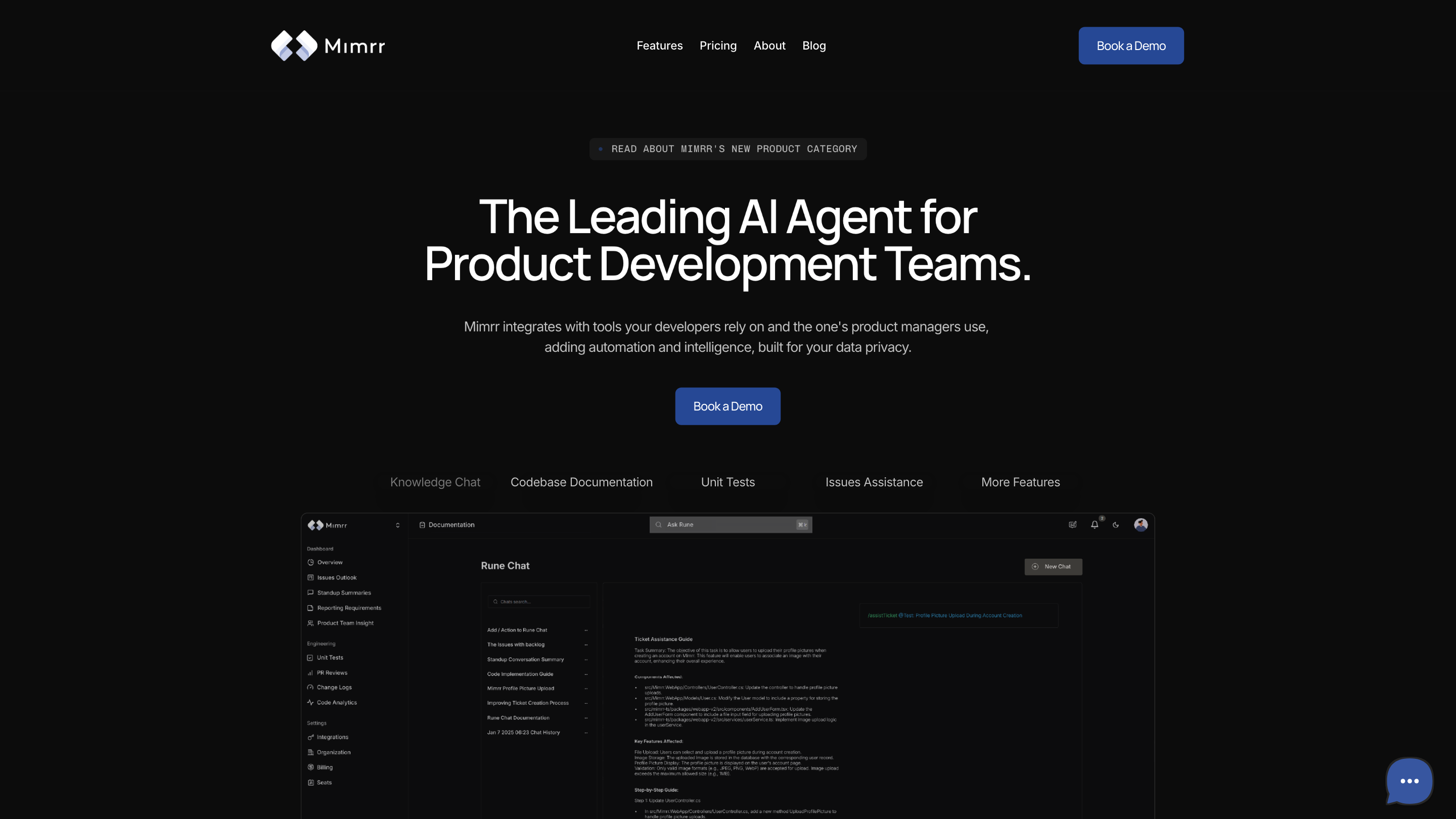Mimrr
Open siteIntroduction
Automate code documentation for software companies.
Mimrr Product Information
Mimrr – AI Agent for Product Development Teams is an integrated AI-powered platform designed to accelerate product development by automating low-level tasks, enabling seamless collaboration between developers and product managers, and facilitating knowledge sharing while prioritizing data privacy.
Overview
Mimrr connects with the tools teams already rely on (GitHub, GitLab, Azure DevOps, Bitbucket, Jira, Slack) to provide automated insights, task automation, and intelligent assistance across the development lifecycle. It emphasizes data privacy, never trains on your data, and can run in your VPC or on-prem infrastructure. The platform aims to dissolve knowledge silos, speed up onboarding, and help teams ship features faster with reduced technical debt.
Key Capabilities
- Integrations: Connect GitHub, GitLab, Azure DevOps, Bitbucket, Slack, and Jira for seamless code, issue, and collaboration updates.
- Project Onboarding: Quick setup of code repositories, tickets/issues groups, channels, and product teams.
- Automation: Automate unit tests, codebase documentation, ticket writing, requirements reporting, PR reviews, and more.
- Documentation: Automatically generate and update public API documentation and private codebase docs.
- Onboarding Assistant: Rune chat helps new developers understand the codebase rapidly.
- Compliance & Privacy: Designed to deploy in your infrastructure with strong data privacy assurances; does not train on your data or send it to third-party AI services.
- Scalability: Built to scale from startups to enterprise with large codebases.
- Visibility & Insights: Actionable development process insights to reduce technical debt and improve collaboration between stakeholders.
- Outcomes: Faster shipping, reduced silos, improved governance, and more predictable delivery.
How It Works
- Connect your development tools and onboard your team.
- Define project structure (code repos, issue groups, channels, product teams).
- Leverage Rune and automations to generate documentation, automate repetitive tasks, and provide actionable insights.
- Monitor progress with integrated dashboards and reports; iterate to improve workflows.
Safety and Privacy Considerations
- Deployable in your own VPC/On-prem infrastructure.
- No training on your data, no connection to third-party AI solutions for data processing.
- Focus on secure, governance-friendly automation and collaboration.
Core Features
- Deep tool integrations with major development and collaboration platforms
- Fast project onboarding with structured setup for repositories, tickets, channels, and teams
- Automation of unit tests, codebase documentation, ticket creation, and PR reviews
- Automatic API and private documentation generation and updates
- Rune-based onboarding assistant for new developers
- Privacy-first design: data never leaves your environment; no external model training on your data
- Scalable for organizations from startups to enterprises
How to Use Mimrr (high-level)
- Connect your development tools (GitHub, GitLab, Azure DevOps, Bitbucket, Jira, Slack).
- Create a project and onboard your team with repositories and channels.
- Enable automations (documentation, testing, ticketing, reporting).
- Review actionable insights and documentation outputs; iterate on configurations as needed.
Target Users
- Product managers, software engineers, QA engineers, and DevOps teams seeking to reduce manual toil and accelerate delivery while maintaining governance and privacy.
Pricing & Availability
- Available for deployment in your own infrastructure; details available on request via booking a demo.
Core Features Summary
- Integrations with GitHub, GitLab, Azure DevOps, Bitbucket, Slack, Jira
- Quick project onboarding for teams and channels
- Automation of tests, docs, tickets, requirements, and PR reviews
- Automatic API and codebase documentation generation
- Rune chat for rapid developer onboarding
- Privacy-centric: no data training or external data exposure
- Scales from startups to large enterprises
